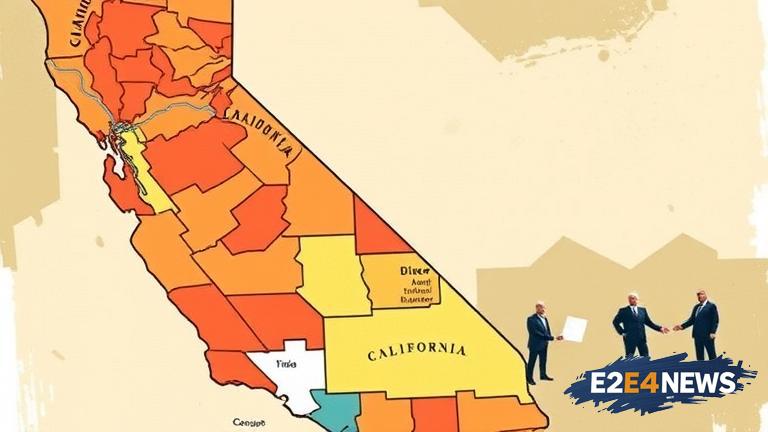The state of California is currently embroiled in a contentious redistricting battle, with various groups and organizations fighting for fair representation in the state’s congressional and legislative districts. The redistricting process, which occurs every 10 years, aims to redraw the state’s district boundaries to reflect changes in population and ensure equal representation for all citizens. However, the process has been marred by controversy, with accusations of gerrymandering and partisan manipulation. The California Citizens Redistricting Commission, a 14-member panel tasked with redrawing the state’s district boundaries, has been working to create new maps that reflect the state’s diverse population. Despite their efforts, the commission has faced criticism from various groups, including Democrats, Republicans, and community organizations, who argue that the proposed maps do not adequately represent their interests. The debate has been particularly heated in the state’s congressional districts, where the Democratic Party is seeking to maintain its majority. The party has argued that the proposed maps do not do enough to protect the rights of minority voters, while Republicans have countered that the maps are biased in favor of Democrats. Community organizations, such as the League of United Latin American Citizens and the National Association for the Advancement of Colored People, have also weighed in on the debate, arguing that the proposed maps do not adequately represent the interests of minority communities. The redistricting battle has also sparked a heated debate over the role of partisan politics in the process. While the California Citizens Redistricting Commission is supposed to be non-partisan, many have accused the panel of being influenced by partisan interests. The debate has been further complicated by the use of advanced mapping technology, which has allowed politicians and special interest groups to manipulate the district boundaries to their advantage. Despite the controversy, the California Citizens Redistricting Commission has vowed to create fair and representative district boundaries. The commission has held numerous public hearings and has solicited input from citizens across the state. However, the deadline for finalizing the new district boundaries is rapidly approaching, and it remains to be seen whether the commission will be able to create maps that satisfy all parties involved. The outcome of the redistricting battle will have significant implications for the state’s political landscape, and could potentially impact the balance of power in the state’s congressional and legislative districts. As the debate continues to unfold, one thing is clear: the fight for fair representation in California’s redistricting process is far from over. The state’s diverse population and complex political landscape have created a challenging environment for the California Citizens Redistricting Commission, and it will require careful consideration and compromise to create district boundaries that truly represent the interests of all Californians. The redistricting battle has also highlighted the need for greater transparency and accountability in the process, and has sparked calls for reform. Many have argued that the current system is flawed and that a more independent and non-partisan process is needed to ensure fair representation. Others have suggested that the use of advanced mapping technology should be limited, and that the process should be more focused on creating district boundaries that reflect the interests of communities rather than partisan interests. As the California Citizens Redistricting Commission continues to work on creating new district boundaries, it is clear that the outcome of the redistricting battle will have significant implications for the state’s political landscape. The commission’s decisions will impact the balance of power in the state’s congressional and legislative districts, and will shape the course of California’s political future. The debate has also sparked a wider conversation about the importance of fair representation and the need for a more inclusive and equitable political process. As Californians continue to weigh in on the debate, it is clear that the fight for fair representation is far from over, and that the outcome of the redistricting battle will have a lasting impact on the state’s political landscape.
